Your Pharmacological treatment of dementia images are ready in this website. Pharmacological treatment of dementia are a topic that is being searched for and liked by netizens today. You can Get the Pharmacological treatment of dementia files here. Find and Download all royalty-free vectors.
If you’re searching for pharmacological treatment of dementia pictures information connected with to the pharmacological treatment of dementia keyword, you have pay a visit to the right blog. Our site always provides you with hints for seeking the highest quality video and image content, please kindly hunt and locate more informative video content and graphics that fit your interests.
Pharmacological Treatment Of Dementia. The efficacy of antidepressants to treat depression associated with dementia is not proven. Common form of dementia and is a major contributor to morbidity and mortality in older Australians. Medications for dementia can have the same effect leading to impaired mobility and risk of falling. Pharmacological approaches are a mainstay of treatment for people with dementia.
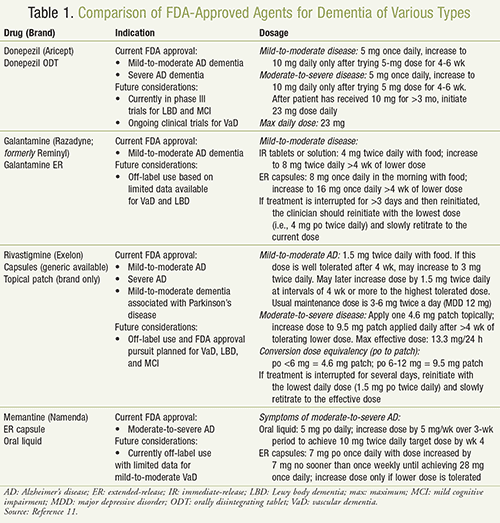 The Inpatient With Dementia From uspharmacist.com
The Inpatient With Dementia From uspharmacist.com
Palliation Stage-specific Treatment Dementia Dementia Terminal Disease q q q q Pharmacological treatment can be broadly conceptualised into three broad categories. Objectives The aim of this article is to provide an overview of available pharmacological therapies for the symptomatic treatment of Alzheimers disease. Approaches to challenging behaviour in dementia3 Pharmacological approaches When non-pharmacological approaches are insufficient to manage the patients behaviour drugs can be added to their treatment. It covers the treatment of both cognitive and non-cognitive symptoms. Reverse or stabilize the underlying disease 2. Therefore concise current evidence-based recommendations are needed.
Medications for dementia can have the same effect leading to impaired mobility and risk of falling.
The main types of medication that can be used are. Research has found that a mediterranean diet high in fish nuts whole grains and plant-based foods may be the most beneficial for dementia prevention. Objectives The aim of this article is to provide an overview of available pharmacological therapies for the symptomatic treatment of Alzheimers disease. Approaches to challenging behaviour in dementia3 Pharmacological approaches When non-pharmacological approaches are insufficient to manage the patients behaviour drugs can be added to their treatment. The efficacy of antidepressants to treat depression associated with dementia is not proven. Of the agents reviewed the atypi-cal antipsychotics risperidone and olanzapine currently have the best evidence for ef-ficacy.
 Source: europepmc.org
Source: europepmc.org
AD is treated with AChEIs donepezil galantamine or rivastigmine and. AD is treated with AChEIs donepezil galantamine or rivastigmine and. In an emergency aggressive behaviour in a patient with dementia may need to be treated with antipsychotic medication. Conclusions Pharmacological therapies are not particularly effective for manage-ment of neuropsychiatric symptoms of dementia. RBD which is a common core clinical feature of DLB can be managed with either melatonin or clonazepam.
 Source: myamericannurse.com
Source: myamericannurse.com
Eat a healthy diet. Pharmacological therapies for the cognitive symptoms associated with Alzheimers disease. Improve cognitive symptomatology 3. Pharmacological approaches are a mainstay of treatment for people with dementia. There are different medications and treatment regimes for dementia.
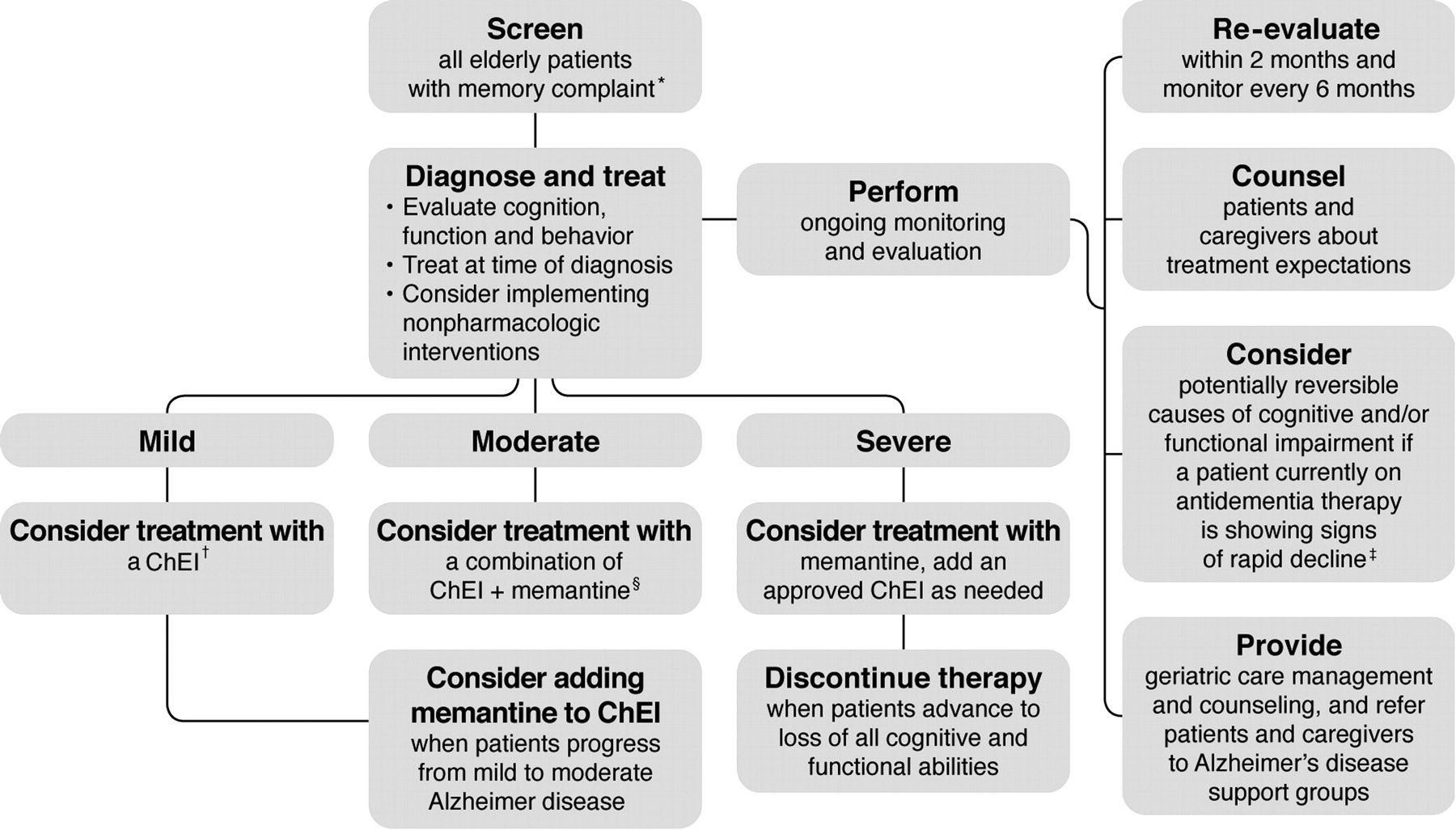 Source: jabfm.org
Source: jabfm.org
Medications for dementia can have the same effect leading to impaired mobility and risk of falling. Therefore concise current evidence-based recommendations are needed. Pharmacological therapies for the cognitive symptoms associated with Alzheimers disease. In an emergency aggressive behaviour in a patient with dementia may need to be treated with antipsychotic medication. Yet having a few non-drug-related tools can help to relieve some of the inevitable stress and add greatly to quality of life.
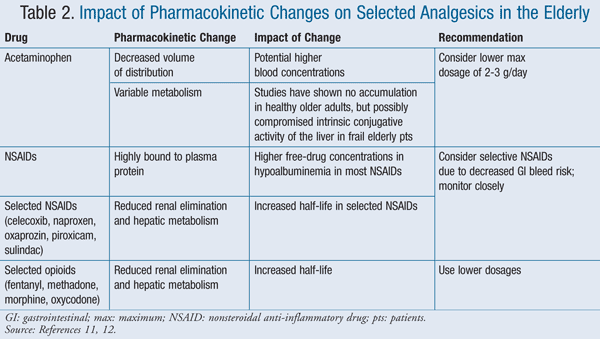 Source: uspharmacist.com
Source: uspharmacist.com
Cholinesterase Inhibitors Memantine Risperidone. Yet having a few non-drug-related tools can help to relieve some of the inevitable stress and add greatly to quality of life. Improve cognitive symptomatology 3. Reverse or stabilise the underlying disease. There is still no treatment established for patients with vascular or frontotemporal dementia.
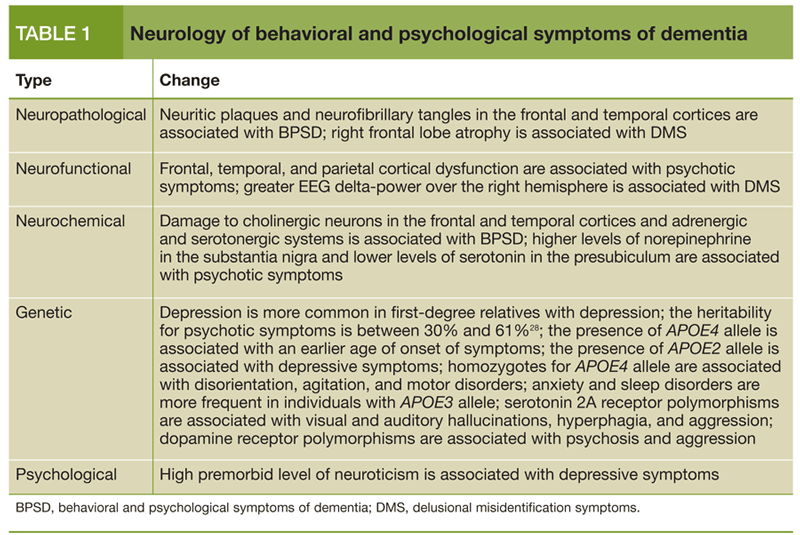 Source: psychiatrictimes.com
Source: psychiatrictimes.com
Common form of dementia and is a major contributor to morbidity and mortality in older Australians. If oral treatment is feasible risperidone or haloperidol should be tried. There is still no treatment established for patients with vascular or frontotemporal dementia. Research has found that a mediterranean diet high in fish nuts whole grains and plant-based foods may be the most beneficial for dementia prevention. In this section you will find papers exploring general prescribing patterns in different settings potentially inappropriate prescribing and the use of pharmacology in specific situations such.
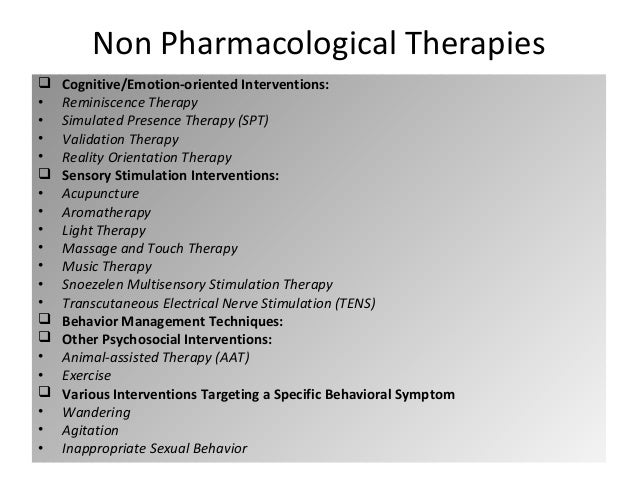 Source: slideshare.net
Source: slideshare.net
Atypical antipsychotics are widely used as the first line pharmacological approach to treat BPSD. Yet having a few non-drug-related tools can help to relieve some of the inevitable stress and add greatly to quality of life. Treat behavioural mood or psychiatric symptoms associated with dementia The rest of the article shall focus on the first two aspects of pharmacotherapy. Medications for dementia can have the same effect leading to impaired mobility and risk of falling. RBD which is a common core clinical feature of DLB can be managed with either melatonin or clonazepam.
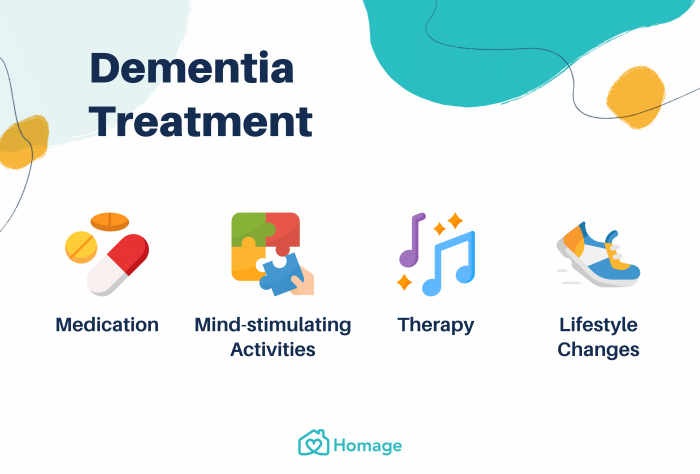 Source: homage.sg
Source: homage.sg
Eat a healthy diet. Yet limited research on pharmacological approaches has taken place outside the clinical trial setting. Approaches to challenging behaviour in dementia3 Pharmacological approaches When non-pharmacological approaches are insufficient to manage the patients behaviour drugs can be added to their treatment. Objectives The aim of this article is to provide an overview of available pharmacological therapies for the symptomatic treatment of Alzheimers disease. There is still no treatment established for patients with vascular or frontotemporal dementia.
 Source: slideplayer.com
Source: slideplayer.com
Treatment with cholinesterase inhibitors andor memantine may delay the onset of BPSD and reduce the severity of some symptoms. Palliation Stage-specific Treatment Dementia Dementia Terminal Disease q q q q Pharmacological treatment can be broadly conceptualised into three broad categories. Table 1 5 7 compares the pharmacologic. Conclusions Pharmacological therapies are not particularly effective for manage-ment of neuropsychiatric symptoms of dementia. Pharmacological therapies for the cognitive symptoms associated with Alzheimers disease.
 Source: aafp.org
Source: aafp.org
RBD which is a common core clinical feature of DLB can be managed with either melatonin or clonazepam. Research has found that a mediterranean diet high in fish nuts whole grains and plant-based foods may be the most beneficial for dementia prevention. The efficacy of antidepressants to treat depression associated with dementia is not proven. Pharmacological therapies for the cognitive symptoms associated with Alzheimers disease. Antidepressants anxiolytics and antiepileptics are also used.
 Source: researchgate.net
Source: researchgate.net
Treatment with cholinesterase inhibitors andor memantine may delay the onset of BPSD and reduce the severity of some symptoms. Pimavanserin may prove to be a useful treatment for psychosis in DLB patients but like other antipsychotic drugs that are used in dementia patients there is a small increased risk of mortality. Of memantine also had conflicting results for treatment of neuropsychiatric symp-toms. Improve cognitive symptomatology and 3. Reverse or stabilize the underlying disease 2.
 Source: consultant360.com
Source: consultant360.com
Palliation Stage-specific Treatment Dementia Dementia Terminal Disease q q q q Pharmacological treatment can be broadly conceptualised into three broad categories. AD is treated with AChEIs donepezil galantamine or rivastigmine and. In adult patients with dementia in the context of Down syndrome memantine is not effective and further studies on acetylcholinesterase inhibitors are warranted. Conclusions Pharmacological therapies are not particularly effective for manage-ment of neuropsychiatric symptoms of dementia. Cholinesterase Inhibitors Memantine Risperidone.
 Source: uspharmacist.com
Source: uspharmacist.com
There is still no treatment established for patients with vascular or frontotemporal dementia. Palliation Stage-specific Treatment Dementia Dementia Terminal Disease q q q q Pharmacological treatment can be broadly conceptualised into three broad categories. RBD which is a common core clinical feature of DLB can be managed with either melatonin or clonazepam. The search for specific treatments for dementia has inevitably concentrated on Alzheimers disease AD partly because it is the commonest cause of dementia and partly because scientific progress has provided more potential therapeutic targets for AD than other dementias. There are different medications and treatment regimes for dementia.
 Source: aafp.org
Source: aafp.org
Improve cognitive symptomatology 3. Table 1 5 7 compares the pharmacologic. We often dont think about non-drug treatments or even regard them as unimportant. Treat behavioural mood or psychiatric symptoms associated with dementia The rest of the article shall focus on the first two aspects of pharmacotherapy. The acetylcholinesterase inhibitors donepezil Aricept rivastigmine Exelon and galantamine Reminyl have been proved effective in clinical trials.
 Source: slideshare.net
Source: slideshare.net
It is important to consider the likely benefits against the likelihood of adverse effects and drug interactions. Of memantine also had conflicting results for treatment of neuropsychiatric symp-toms. In an emergency aggressive behaviour in a patient with dementia may need to be treated with antipsychotic medication. Treatment with cholinesterase inhibitors andor memantine may delay the onset of BPSD and reduce the severity of some symptoms. The search for specific treatments for dementia has inevitably concentrated on Alzheimers disease AD partly because it is the commonest cause of dementia and partly because scientific progress has provided more potential therapeutic targets for AD than other dementias.
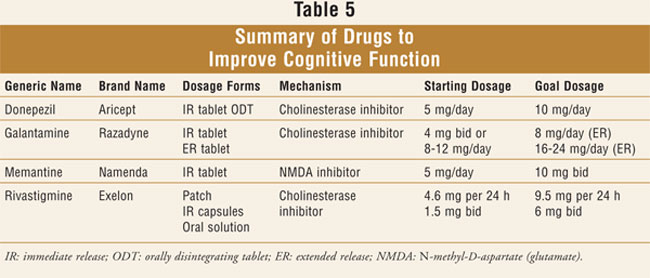 Source: uspharmacist.com
Source: uspharmacist.com
The search for specific treatments for dementia has inevitably concentrated on Alzheimers disease AD partly because it is the commonest cause of dementia and partly because scientific progress has provided more potential therapeutic targets for AD than other dementias. Atypical antipsychotics are widely used as the first line pharmacological approach to treat BPSD. Common form of dementia and is a major contributor to morbidity and mortality in older Australians. Approaches to challenging behaviour in dementia3 Pharmacological approaches When non-pharmacological approaches are insufficient to manage the patients behaviour drugs can be added to their treatment. Reverse or stabilise the underlying disease.
 Source: aafp.org
Source: aafp.org
Of the agents reviewed the atypi-cal antipsychotics risperidone and olanzapine currently have the best evidence for ef-ficacy. Common form of dementia and is a major contributor to morbidity and mortality in older Australians. Pharmacological treatment can be broadly conceptualized into three broad categories. Treatment with cholinesterase inhibitors andor memantine may delay the onset of BPSD and reduce the severity of some symptoms. In an emergency aggressive behaviour in a patient with dementia may need to be treated with antipsychotic medication.

Antidepressants anxiolytics and antiepileptics are also used. Research has found that a mediterranean diet high in fish nuts whole grains and plant-based foods may be the most beneficial for dementia prevention. Pharmacological treatment can be broadly conceptualized into three broad categories. Medications for dementia can have the same effect leading to impaired mobility and risk of falling. The search for specific treatments for dementia has inevitably concentrated on Alzheimers disease AD partly because it is the commonest cause of dementia and partly because scientific progress has provided more potential therapeutic targets for AD than other dementias.
 Source: sciencedirect.com
Source: sciencedirect.com
Reverse or stabilize the underlying disease 2. Objectives The aim of this article is to provide an overview of available pharmacological therapies for the symptomatic treatment of Alzheimers disease. Yet having a few non-drug-related tools can help to relieve some of the inevitable stress and add greatly to quality of life. Pimavanserin may prove to be a useful treatment for psychosis in DLB patients but like other antipsychotic drugs that are used in dementia patients there is a small increased risk of mortality. In an emergency aggressive behaviour in a patient with dementia may need to be treated with antipsychotic medication.
This site is an open community for users to do submittion their favorite wallpapers on the internet, all images or pictures in this website are for personal wallpaper use only, it is stricly prohibited to use this wallpaper for commercial purposes, if you are the author and find this image is shared without your permission, please kindly raise a DMCA report to Us.
If you find this site good, please support us by sharing this posts to your own social media accounts like Facebook, Instagram and so on or you can also save this blog page with the title pharmacological treatment of dementia by using Ctrl + D for devices a laptop with a Windows operating system or Command + D for laptops with an Apple operating system. If you use a smartphone, you can also use the drawer menu of the browser you are using. Whether it’s a Windows, Mac, iOS or Android operating system, you will still be able to bookmark this website.





